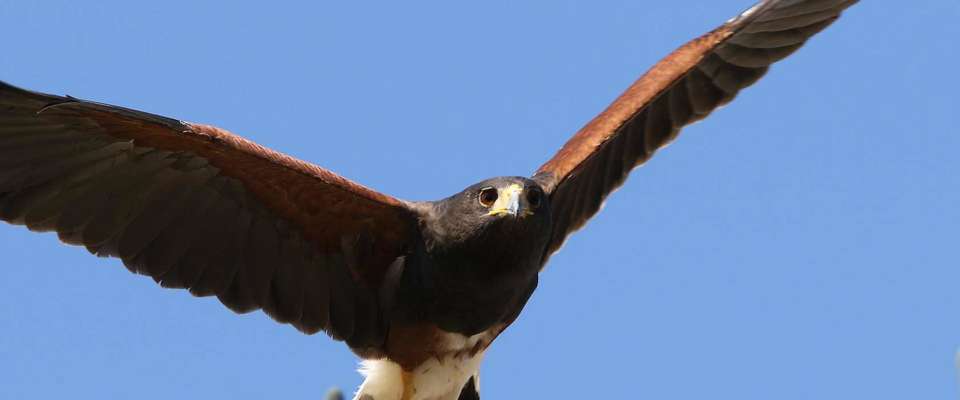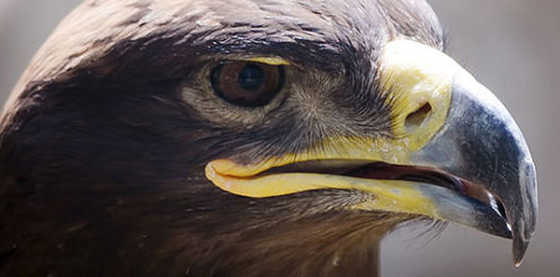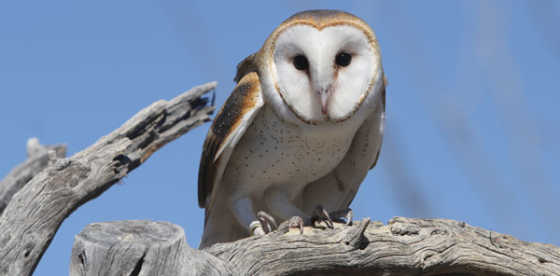
Wildlife protection
You can help keep our wildlife safe
Contact: Report raptor habitats at TEP Customer Care or contact us at 520-623-7711.
Warning: Do not create attractions such as providing food or water for birds adjacent to electrical equipment.
Safety
Keeping birds and animals safe from electrical hazards is an ongoing challenge. Animals are creative and inconsistent in how they interact with electrical facilities. TEP has taken significant steps to protect wildlife from electrical equipment, a task that requires continuous effort and innovation. Studies done by Bill Mannan, University of Arizona, and his students have shown that appropriate installation of bird guard materials on electrical equipment within 300 meters of raptor nest sites significantly reduces injuries and fatalities.
Have you ever seen a bird of prey on a utility pole and wondered, “Is that bird safe?”
How you can help
Southern Arizona provides habitat for many species of birds called raptors or birds of prey. Several species, including Harris' Hawk, Great Horned Owls and Red-tailed Hawks favor utility poles for perching, hunting and socializing. Harris' hawks, live in family groups which expose them to greater risk of electrocution than other raptors.
You can help by volunteering with area nonprofits engaged in wildlife protection and conservation education.
Thanks to study data, community support, customer communications and TEP fieldwork; efforts to reduce raptor deaths are showing positive results. Continuing public involvement in wildlife education, nest surveys and equipment research is appreciated.
Participate in environmental education programs or sponsor one for your class or organization:
- Arizona Sonora Desert Museum
desertmuseum.org - Pima County Natural Resources at 520-615-7955 or
education@pima.gov - Tucson Audubon Society, 520-622-2230 or
tucsonaudubon.org
Contact us
Immediately report any raptor nest sites, injured or dead raptors or animals:
- Email TEP Customer Care
- Call TEP Customer Care at 520-623-7711, or
- Call Arizona Game and Fish at 520-628-5376, extension 4446.
Calls to TEP will result in an immediate referral to a TEP employee and a University of Arizona biology consultant, who will do a site assessment to identify raptor activity and potential risks to raptor nesting and roosting areas. Every effort is made to respond within 48 hours. TEP crews will make appropriate modifications to the energized equipment to reduce risk to wildlife.
Hints and tips
Helpful hints from the Tucson Wildlife Center on keeping animals and birds safe:
- Wait until fall to trim your palm trees. Many birds use them to nest in the spring.
- Cap your chimneys to prevent raccoons, squirrels, and birds from using them as nesting areas.
- If you see a desert tortoise crossing the road, stop, pick it up and place it on the side of the road in the direction it was going.
- If you find a baby bird under a tree, it has probably fallen from the nest. If it looks like it has a broken wing or leg, or looks injured in any way call the Tucson Wildlife Center at 520-290-9453. If it is unharmed and you can safely return it to its nest, please do so. Call the Tucson Wildlife Center if you need assistance.
- If you find a reptile near your home and want to relocate it, do not relocate it more than ¼ mile from where you found it. If you do, it is would be akin to dropping you in the middle of Nepal empty-handed and expecting you to find food, water, and shelter. Call the Tucson Wildlife Center if you need assistance.
- If you see a javelina on your street or in your yard, stay indoors and enjoy watching it through your window.
- If you find a bird nest, give it plenty of space. If the female leaves the nest while you are observing it, you are too close. Back up until the bird returns and does not leave the nest again while you are observing it. Disturbing a nesting female can cause her to abandon the nest. Enjoy watching the babies grow from a distance using a pair of binoculars.
- Do not feed the wildlife. They become dependent on humans, may cross busy streets for food and can become a nuisance animal. If someone reports the animal, authorities could euthanize it. It is also now against the law.
- When poisons are used to eliminate rodents, the raptors and large mammals may also die when the rodents or carcasses are eaten. Please use Havahart live traps. Antifreeze is sweet-tasting and kills many animals.
- Do not leave pet food outside. Animals may become dependent on you for food and become a pest. Supervise pets when outdoors, just like you would young children.
- Don't touch injured wild animals. If you are bitten, the animal will have to be euthanized for rabies testing. Call TWC first for advice.
- Keep dogs on a leash when out walking.
Burrowing owls
In collaboration with Wild at Heart, TEP employees and volunteers help construct burrowing owl habitats to provide homes for owls displaced by development in their native habitats.
TEP volunteers have worked along the Santa Cruz River Park and in Marana to create artificial burrows and assist with release tents for the owls to be fed and become acclimated to their environment.


